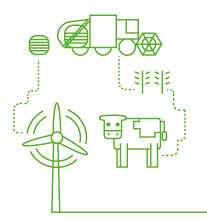Smart devices and the ‘Internet of Things’ (IoT) have developed into smart business in the agribusiness space. IoT has been a buzzword for the last few years, but many farmers may have dismissed the hype.
The array of internet-connected gadgets from fridges to televisions and even kettles aren't much use on a farm. However, as technology matures, many business use-cases have developed, which are already being adopted. The agribusiness sector stands to benefit from integrating big data and connected devices.
IoT solutions may be a key component in helping farmers to meet these demands. Smart farming can reduce manual labour needs and close the supply gap by optimising:
- High yield production
- Profit margins
- Personnel productivity
- Resource optimisation
- Product quality
- Environment protection (land, wastage, and water management)
With the ability to monitor and manage we can expect the following developments in farming:
More precise farm management tools
Each year technology becomes cheaper and more advanced. Aggregating the data logged from fertiliser usage, soil quality and water management in harvested locations, farmers no longer have to rely on manual charting. This will help them better utilise land which has not been depleted of nutrients.
Automated Livestock Farming Technology
Smart farm-tech can assist with improvements in animal care and subsequently the quality of farming products. For example, dairy processing can be improved via automation, and making data-based adjustments to feed mixtures tailored to suit animal health, feeding frequencies and welfare requirements.
Real-time data collection to improve bird and rodent management
Farmers traditionally rely on manually setting traps and other elimination techniques. This naturally consumes a vast amount of time and personnel resources. New IoT techniques are being deployed which use cameras and smart sensors to detect rodents' nest locations in farmlands.
Via an interface, farmers can monitor pest activities and active time periods. Further developments are expected, with recent studies focused on the use of light and sound techniques on birds to reduce crop damage.
Optimised water and waste management
Irrigation and clean, regular water are vital to many farming operations. In fact, agriculture consumes approximately 70% of water use worldwide. IoT connected sensors can notify farmers in real time when soil moisture levels are optimal. This allows farmers to be strategic in their water use, increasing the water regularity and reducing the duration of water use.
Farm automation connected devices and Agritech are going mainstream and will be a requirement for any land operator in the future. Farmers who wish to remain competitive must grasp these solutions with both hands. Who wouldn't want to reduce costs, reduce manual labour requirements, and increase profitability? As it turns out, smart gadgets are smart agribusiness.
For more information
If you would like more information on how your agribusiness can benefit from the Internet of Things, please contact your local RSM office.




